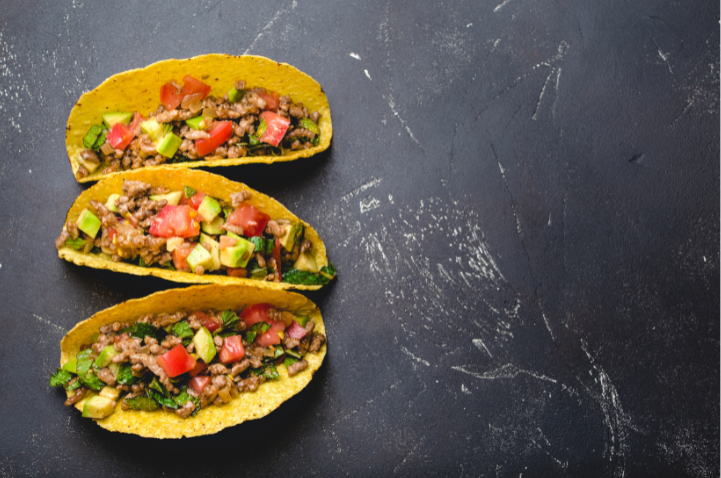Picture this it’s Tuesday evening, you’re craving a sizzling taco. It’s Taco Tuesday – a beloved tradition for many. But what if behind this innocuous weekly tradition lies a simmering legal feud?
In May 2023, Taco Bell filed a petition with the US Patent and Trademark Office (USPTO), challenging their competitor’s—Taco John’s—trademark of “Taco Tuesday.” Taco John’s trademarked the phrase in 1989 and had rights to the trademark in every state except New Jersey (which had been held by Gregory’s Restaurant and Bar since 1982). For over thirty years Taco John’s has sought to protect their mark by sending cease and desist letters to those who used it without permission. Though Taco John’s was rather litigious in its protection of the “Taco Tuesday” mark, it rarely made headlines outside of local newspapers.
While the statements made by both companies have been somewhat tongue in cheek, Taco Bell’s complaint raises a serious issue within the world of trademarks. Trademark attorney Josh Gerben stated that “[Taco Tuesday] has become a cultural phenomenon,” which severely weakens its power as a mark.
In its complaint to the USPTO’s Trademark Trial and Appeal Board (TTAB), Taco Bell asserted that the trademark had become a common phrase. Trademark law states that words, phrases, and logos that are considered by examiners to be “common” or “generic” cannot be trademarked. While the Lanham Act allows virtually anything—be it a sound, smell, color, name, phrase, or logo—to be trademarked, it must be capable of denoting the source of the goods and be distinctive. This standard of distinction is pivotal because a mark, if properly maintained, can be renewed indefinitely. Where patents and copyrights expire over time, trademarks can give a business the monopoly on a mark in perpetuity. If marks were granted for “common speech,” trademark disputes would be overwhelming and everlasting.
When determining whether a mark should be granted or not, USPTO examiners determine to what degree a mark is distinctive. Marks that are considered generic are almost always denied registration—for example, the mark “Milk” for whole milk. Marks that are found to be descriptive are more difficult to successfully register but are slightly more imaginative than generic marks—for example, TurboTax for software that makes reporting taxes quicker. Suggestive and arbitrary trademarks are considered strong. Suggestive marks have some description of the good or service but require a level of imagination and creativity that the former kinds of marks lack. Microsoft, Netflix, and Coppertone are all suggestive trademarks. Arbitrary marks use words that have seemingly no relation to the product at hand—like Apple for computers, Dove for chocolate, or MILK for makeup. The strongest type of trademarks are those deemed fanciful. These marks are words that did not exist prior to their use as a mark (like Kodak or EXXON).
At the time of filing, “Taco Tuesday” was a suggestive trademark, but over time this term has become generic. When a trademark becomes so commonly used that it no longer identifies the source of goods or services, it has suffered from “genericide.” Taco John’s is not the first business to have a mark become generic; genericide has affected previous marks like “Aspirin” and “Escalator,” and now claims “Taco Tuesday.” While every business wants their mark to become a household name, the more widespread a mark becomes the more the potential for genericide mounts.
Though Taco John’s attempted to protect its mark—sending cease and desist letters to accidental infringers—their efforts were not enough to preserve its novelty. Former marketing executive Billie Jo Waara even stated that despite the fact “that the unauthorized use [of Taco Tuesday] is prolific,” the company has “asserted our trademark against national companies, restaurants big and small, and even pharmaceutical companies.”
In July 2023, Taco John’s declared that it was going to abandon the “Taco Tuesday” trademark. After only a few months, the legal battle to protect the mark had become too steep and due to the high legal costs Taco John’s was forced to end the fight. TTAB cases have the potential to last two years before receiving a decision—an incredibly long conflict to finance when the outcome is not likely to be good. Even if Taco John’s had continued to fight and successfully managed to defeat the complaint, the power of a surviving “Taco Tuesday” mark likely would not live up to the investment put into preserving it.
In October 2023, Taco Bell successfully won the battle for full removal of the legalities surrounding the “Taco Tuesday” trademark when the lone holdout, Gregory’s Restaurant and Bar, surrendered its trademark registration. Gregory’s Restaurant and Bar had owned the “Taco Tuesday” mark in New Jersey for the past 40 years. Trademark attorney, Josh Gerben, stated that surrendering the trademark was the “right move” as the chance to “successfully defend the cancellation action against the ‘Taco Tuesday’ mark were extremely low” and the legal fees would have been an “extreme burden to bear for any small business.”
All businesses run the risk of having their marks challenged by others, or even going to court for infringement – as Taco John’s did for nearly four decades! Trademarks are essential to businesses, with being able to protect and enforce them even more so. Your company can be sued for IP infringement for the basic act of making, using, selling, importing, or offering for sale any good or service. Insuring your business’s trademark rights against infringement is something the experts here at IPISC have been doing for decades! If you are interested in protecting your IP against future infringers, visit our website and connect with us at https://ipisc.com/solutions/.


